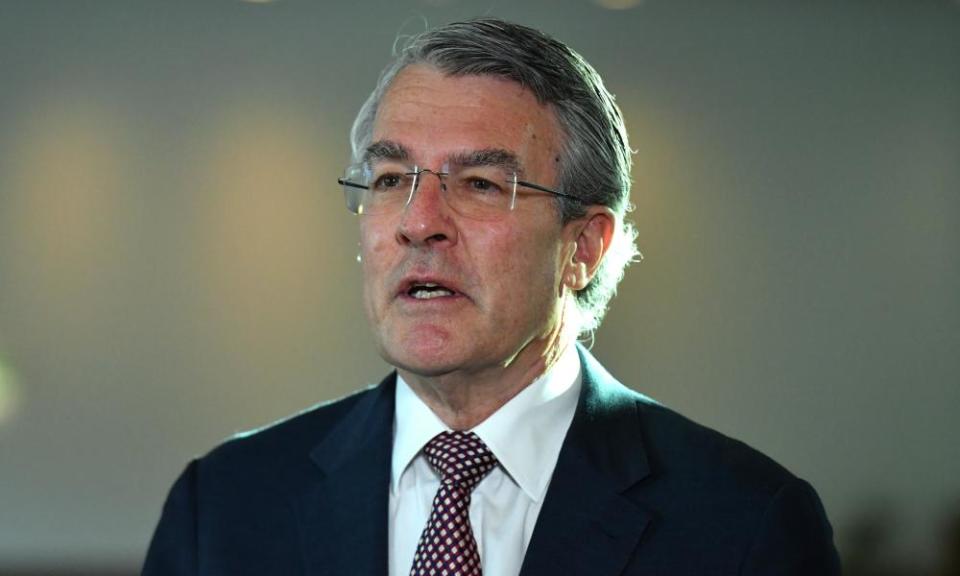Labor won’t oppose religious discrimination bill in lower house, if efforts to delay vote fail

Labor will aim to sidestep the religious discrimination stoush by reserving its position on the Morrison government bill until after a committee inquiry, but may wave it through the lower house if the government forces a vote.
The shadow attorney general, Mark Dreyfus, took that recommendation to shadow cabinet on Monday evening before Labor caucus adopted it on Tuesday, its first meeting since Scott Morrison introduced the bill late last week.
The fate of the bill is still unclear and is unlikely to be debated on Tuesday.
While the Coalition leadership is keen to see it voted on, the government is in a standoff with Labor and its own moderate Liberal MPs, who want to wait for an inquiry to report first.
On Friday, Morrison referred the bill to a joint human rights committee inquiry reporting on 4 February, despite previously calling for a Senate-only inquiry with no input from MPs.
Labor argues that having backed down from that position it would be highly unusual for the government to attempt to force a vote in the House of Representatives before the committee reports, and is seeking to enlist support from Liberal moderates to prevent it happening.
Related: Inquiry into religious discrimination bill should not consider other exemptions, chair says
Morrison could still seek a vote this week in a bid to wedge Labor, which is concerned not to appear out of touch with religious communities after a poor showing among that demographic at the 2019 election.
The Labor caucus agreed to reserve its final position until after an inquiry; pursue “procedural measures” to delay a vote; but, if forced, to “not oppose” the bill in the lower house.
Even if the bill passes the lower house, Labor and crossbench parties would have a further opportunity to block or amend it in the Senate in the new year.
Labor resolved that it would make clear the principles that will guide its final position and the need for the government to deliver on its three-year-old commitment to protect LGBT students from discrimination.
Several Liberal moderates including Trent Zimmerman, Fiona Martin, Katie Allen, and Dave Sharma have expressed concerns about the bill including the need to protect LGBT+ teachers and students and prevent unintended consequences.
But it is unclear whether that group will support Labor’s bid to delay a vote or refer the bill to a joint select committee instead of the human rights committee.
Only Liberal MP Warren Entsch has said he would not vote for the bill if the government forced a vote before the inquiry is complete.
On Monday, the human rights committee chair, Anne Webster, told Guardian Australia she does not believe the inquiry should consider exemptions that allow schools to discriminate against teachers and students for their sexuality.
On Tuesday the committee announced it had resolved to “accept submissions strictly addressing its terms of reference: that is, relating to the religious discrimination legislative package”.
Stakeholders will have until 21 December to make submissions, with three public hearings to be held on 21 December, 13 and 14 January.
Last week some equality advocates were concerned that Anthony Albanese’s initial reaction to the bill was to declare his support for “religious freedom”.
But the Labor leader has also stressed that changes should not come at “the expense of discriminating on the basis of other people’s characteristics”, a point reinforced by Senate leader Penny Wong.
The attorney general, Michaelia Cash, removed some of the most controversial elements of the bill before it was introduced to parliament, including those allowing medical practitioners to object to procedures and overriding employers’ codes of conduct on religious speech.
Related: Liberal MPs under pressure from independents over protections for gay students and teachers
But many in Labor are now turning their minds to concerns the bill will override state discrimination laws on statements of belief and religious education institutions’ hiring practices.
On Monday, the Equality Australia chief executive, Anna Brown, urged the government and the committee to consider the religious exemptions to other discrimination laws and called for “legislation as soon as possible … without further delay to remove this discrimination” on grounds including sex and sexuality.
Brown told reporters in Canberra it would be “an act of bad faith by the government” to put the bill to a vote before the inquiry could consider concerns about the bill and “utterly unacceptable” if it were waved through the lower house.
“We need time to carefully consider those impacts – to hear from the community before any vote is taken on this legislation.”
“We would urge all parliamentarians to support our efforts to ensure there is proper time, to support an extension of the reporting period or a deferral of a vote on this bill until we can have a proper inquiry.”

 Yahoo Finance
Yahoo Finance 